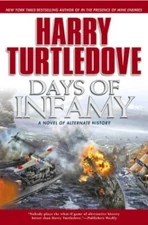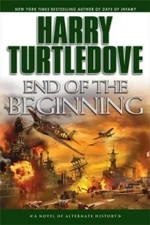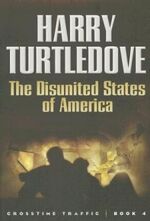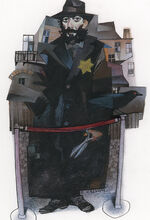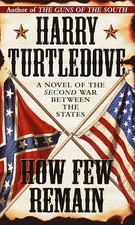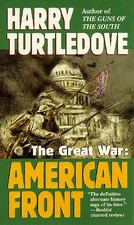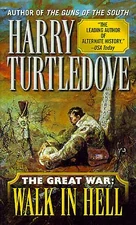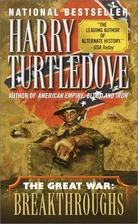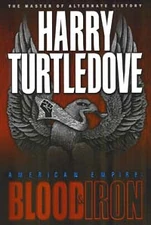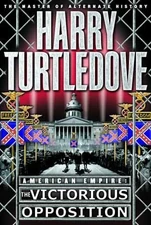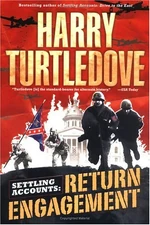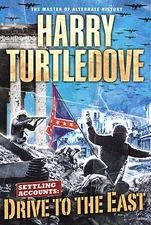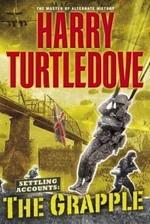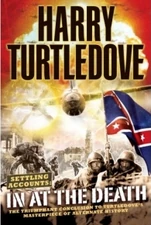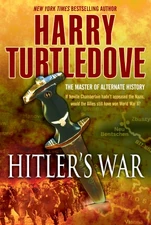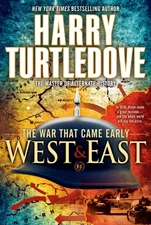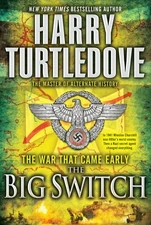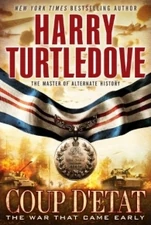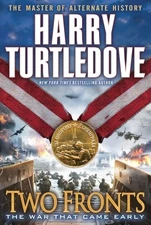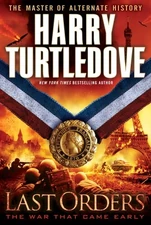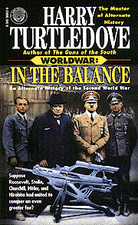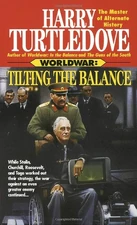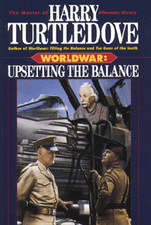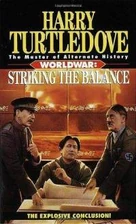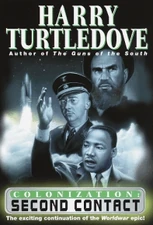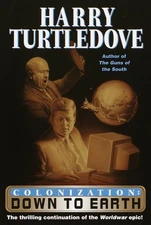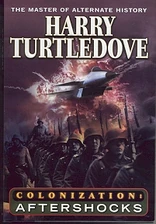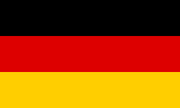
The flag of Germany
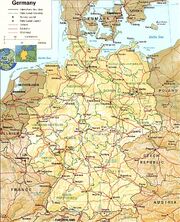
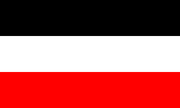
The flag of the German Empire, which was used from 1867-1918 in OTL; it remained in use after that time in Southern Victory, Curious Notions and "Uncle Alf".
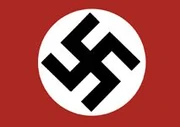
The Nazis swastika, used as the German flag from 1933-1945. In a number of Harry Turtledove works, the flag remained in use after 1945, and even into the 21st Century.
The Federal Republic of Germany is a country in West-central Europe. It is bordered to the north by the North Sea, Denmark, and the Baltic Sea; to the east by Poland and the Czech Republic; to the south by Austria and Switzerland; and to the west by France, Luxembourg, Belgium, and the Netherlands.
A region referred to as "Germania" inhabited by several tribes was known and documented before AD 100. Despite the best efforts of the Roman Empire, this region was never subdued or annexed. Eventually, Germanic tribes played a role in the fall of the Roman Empire.
Beginning in the 10th century, German territories formed a central part of the Holy Roman Empire. This entity dissolved in the early 19th century.
The modern nation-state of Germany was centered on the state of Prussia, and unified in 1871. The newly formed empire quickly asserted itself in European and global politics, but the empire was shattered and the monarchy removed in 1918 with Germany's defeat in World War I. Germany was reformed as the parliamentary Weimar Republic.
Anger at the country's war-time defeat combined with terrible economic conditions in the late 1920s saw the rise of the Nazi Party under Adolf Hitler in 1933 and the dissolution of the Weimar Republic. Hitler initiated a foreign policy intent upon placing Germany as the superpower in Europe. Hitler embraced notions of the superiority of the German "race", and the inferiority of other groups, most notably the Jews. Hitler's policy led to World War II and the Holocaust, and in turn led to Germany's absolute defeat in 1945.
In 1949, Germany was divided into two separate states—East Germany and West Germany—along the lines of Allied occupation, with the Soviet Union dominating the East, and the Western Allies, the United States in particular, dominating the West. The two states were reunited into a federal parliamentary republic in 1990. Germany has become one of the largest economies on the globe.
Note
The vast majority of Harry Turtledove's works depict a version of Nazi Germany. A smaller number depict a version of the Kaiserreich.
Germany in Crosstime Traffic
In the home timeline, Germany was a member of the European Union. There were several alternates where Germany had won World War II. These were deemed particularly terrible. In some of them, the Axis had conquered the United States. The Crosstime Traffic employee Eduardo Caruso considered these alternates to be "only slightly worse" than one in which the Soviet Union won the Cold War.[1] In one of these alternates, Nazi Germany was responsible for starting a devastating nuclear war.
Germany in Curious Notions
In the alternate designated "3477" by Crosstime Traffic, Germany emerged victorious from the brief war of 1914 when the Schlieffen Plan proved a complete success, in no small part because Russia mobilized against Germany more slowly than it had in the home timeline. Stronger German forces wheeled around behind Paris, France, knocking France out of the war and United Kingdom with them. Russia was simply smashed. Germany annexed various territories and created several puppet kingdoms, including Poland, Finland, Courland, and the Ukraine.
In the late 1930s, France and Britain initiated another war, but that was quickly snuffed out, and Germany proved to be the absolute ruler in Europe. Russia did not participate in this second war as it had been embroiled in a state of civil war since 1914. It turned to the United States, which watched Europe with great anxiety. By the late 1940s, Germany had developed the atomic bomb. In 1956, Germany attacked and defeated the United States, and instituted an occupation that would last for the next 150 years.
Germany maintained its rule by keeping a tight lid on technological advances. Thus, when Paul and Lawrence Gomes, father-and-son employees of Crosstime Traffic and denizens of an alternate timeline opened the store Curious Notions in San Francisco, the German authorities took notice. The store sold technology that, while obsolete in the Gomes' home, was above anything available to the average American. The store also caught the eye of the Chinese Triads operating in the city.
This timeline was viewed by all Crosstime employees as a particularly bad one, though comparatively "less nasty" than another timeline, one in which Nazi Germany won World War II.
Germany in Gunpowder Empire
See:Germania
Germany in The Gladiator
Germany was divided between the victorious Allied Forces after World War II. When the Soviet Union won the Cold War in the twentieth century, Germany was reunified under a single communist government.
While Germany was one of the countries most devoted to Marxism, the Soviet Union nonetheless kept a tight control on Germany, a country that had invaded Russian territory twice in a generation.
The Germans made the Trabant automobile, which were notorious for the dirty emissions.
Germany in In High Places
The Germanies were a set of provinces and kingdoms in an alternate where the Great Black Deaths wiped out 4/5 of the population of Europe. Like the Kingdom of Versailles, the people of the Germanies believed in the Second Revelation of Henri. The Germans made the sign of the wheel in the opposite direction, which proved to their French cousins just how stupid Germans were.
Due to the many wars among the disparate states in the Germanies, interregnums were common into the late 21st Century.
German men wore tight breeches and rimless hats.
Germany in The Disunited States of America
In an alternate in which the United States failed, the German states never unified. In the late 21st Century, this left Prussia as the largest and most powerful of the numerous German-speaking states of Central Europe.
Germany in Days of Infamy
Germany was locked in a death-struggle with the Soviet Union when its ally Japan invaded and occupied the American territory of Hawaii in December 1941. Days after the initial attack, Germany declared war on the United States. Germany's harassment of U.S. shipping in the Atlantic benefited Japan's position in the Pacific to some extent, but ultimately, Germany gave little aid to Japan's war-effort.
Germany in In the Presence of Mine Enemies
Germany was the dominant superpower of the world and its Greater German Reich was the largest land empire the world had ever seen. Its capital was Berlin, one of its largest cities. By 2010, it was ruled by its fourth Führer Heinz Buckliger. His predecessors included Adolf Hitler, Heinrich Himmler and Kurt Haldweim with the former two responsible for the Reich's founding and expansion.
The Reich espoused racist views and the "superiority" of the Aryan race. All inferior races considered ("Untermensch") like Jews, Slavs, Roma, Arabs, Negroes and homosexuals were exterminated and/or enslaved. During the Second World War in the 1930s to 40s, the Reich and its Axis allies defeated the United Kingdom, France and the Soviet Union and divided all of Europe, Africa, Asia and part of the Pacific among themselves. During the Third World War of the 1960s to 70s, the Reich and Japan subdued the United States which had remained in neutral isolation during the earlier war.
The vast territories formally annexed as part of the Reich included Germany's boundaries, Britain, the Low Countries, and nearly everything eastwards from there, through the former Poland and Soviet Union, deep into Siberia, the Caucasus, and India. Most of Africa (including former British, French and Belgian colonies) was also an integral part of the Reich.
In addition to the Reich itself, the "Greater Germanic Empire" included two other sub-categories: occupied but not formally annexed countries, including France, the USA, and Canada, and; "allies", including Sweden, Finland, Spain, Portugal, Hungary, Romania, Bulgaria and the Italian Empire. Allies outside Europe included South Africa and the countries of Latin America, specifically Argentina and Brazil. Several of Germany's allies (Italy, Spain, and Portugal) had sizeable empires in Africa and in the Middle East. But these allies were not truly independent of Germany. Only Japan ruled a truly independent empire, encompassing much of Asia and the Pacific.
The "occupied but not annexed" countries did have their own governments and some measure of real autonomy. But even "unoccupied allies" had to accept considerable limitations on their sovereignty and German interference in their internal affairs, especially in matters of the Nazi racist ideology.
In 2006, Germany won the World Cup. According to his wife Lise Gimpel, Heinrich Gimpel "whooped like an Indian" when Germany scored the winning goal.
List of Known Countries Part of the Reich
- Afghanistan
- Austria
- Czechoslovakia
- Denmark
- India
- Iran
- Norway
- Poland
- Russia/Soviet Union
- United Kingdom
- Yugoslavia
List of Known Occupied Countries Part of the Reich
Germany in "Joe Steele"
Germany under Adolf Hitler became a formidable power in Europe. This gave US President Joe Steele a convenient scape-goat; nearly every person who opposed Steele was eventually "revealed" to have ties to Germany.
While Steele and Hitler hated each other, Steele was content to leave Germany to its own devices. However, as Germany soon dominated Europe, Steele concluded that the Atlantic Ocean would not sufficiently protect the US. He began funding Britain and later the Soviet Union when Germany invaded in 1941.
Germany's downfall came during the invasion of the USSR. After German forces were broken at the Battle of Trotskygrad, the US and Britain launched an invasion of occupied Europe. Germany was caught in a vise, and utterly defeated.
Germany in "Must and Shall"
Germany provided clandestine help to rebels in the United States South (unreconciled to their defeat in the Great Rebellion nearly a century before) during both World Wars in an attempt to keep the US government busy at home and unable to intervene in European affairs.
Germany in "News From the Front"
Germany's efforts during World War II were benefited by the American media, which was very hostile to President Franklin D. Roosevelt in 1941 and 1942.
Germany in "Ready for the Fatherland"
Germany was able to negotiate a separate peace with the Soviet Union after General Erich von Manstein shot and killed Adolf Hitler on February 19, 1943. Manstein became German Chancellor, and Germany consolidated its power in Europe, repelling the Allied invasion of Italy and France. In 1953, an exchange of sunbombs in Japan nearly brought the United States and the Soviet Union to war. Manstein was able to mediate a ceasefire. Joseph Stalin's timely death also helped diffuse the situation.
In 1979, as the Soviet Union threatened British oil resources in the Middle East, Britain opened up a dialogue with Germany, which was making claims to oil in the North Sea. At the behest of the German government, the British secret service helped the government of Croatia capture a Serbian rebel, in exchange for unfettered access to the North Sea oil.
Germany in "Shtetl Days"
Under the rule of the Nazi Party, the German Reich emerged triumphant from the War of Retribution in the first half of the 20th Century, and soon imposed its will upon the globe. It systematically eliminated all of the Jews, making thorough records of Jewish culture as it did.
In the mid-21st Century, Germany established a variety of shtetls as tourist attractions. The shtetls were meticulous recreations of the villages the Reich had wiped out a century before. The Reich also hired historical re-enactors to reside in these villages and play the part of Jews. The commitment of the re-enactors to their craft was such that they learned Yiddish, Hebrew, and Aramaic, studied the Talmud and the Torah, and soon, came to see themselves as Jews first, rather than Germans. In this way, the German Reich resurrected its long vanquished "enemy".
Germany in Southern Victory
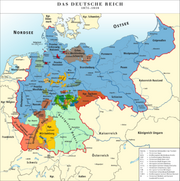
Germany had unified around Prussia by 1870, following a series of wars, including with its neighbor France. After the United States was defeated by the Confederate States, Britain, and France in 1882, Germany developed an important alliance, later known as the Central Powers, with the U.S.A. The United States emulated German military and social organization (people had to line up for manufactured goods and coal, and bureaucracy became rampant) to make itself better able to oppose the Confederacy.
The Great War
Under the rule of Kaiser Wilhelm II, Germany supported Austria-Hungary against first Serbia and then Russia following the assassination of the Austro-Hungarian prince Franz Ferdinand, an act that triggered the various alliance systems put in place across Europe and North America, and the Great War began.
During the war the Germans developed numerous weapons innovations, including poison gas and a variety of aeroplanes. They shared these with the United States, which in turn taught Germany to build barrels, helmets, and light machine guns. Germany also supported the Russian Revoluion; the Rising in Ireland and established a state in Poland on former Russian territory.
Following several years of stalemate, Germany defeated France and, with help from the US, Britain. It thus established itself as the dominant power in Europe, occupying Belgium and the Ukraine, annexing the former French province of Lorraine and the Belgian Congo.
Interwar Years
Its period of dominance was short-lived, however, and was marked by elevated tensions with the US. The two victors cooperated in a joint naval operation to block British interference in the Republic of Ireland, but throughout the 1920s many people from both countries believed that a US-German conflict was not out of the question.
While tensions with the US eased during the 1930s, Germany suffered a string of setbacks in Europe. The Germans were unable to prevent the hostile Action Francaise from coming to power in France or the Silver Shirts from joining the ruling Conservatives in Britain. Bolshevik revolutionaries in Russia were crushed by Tsar Mikhail II, Austria-Hungary grew increasingly unstable, and strong Anglo-French support for the Nationalists allowed them to triumph over the German-backed Monarchists in the Spanish Civil War.
When Kaiser Wilhelm II died in 1941, his son, Kaiser Wilhelm III faced a renewed war with the revitalized Entente. Wilhelm III's perceived weakness encouraged the British and French to invade Belgium and Alsace-Lorraine, and within a matter of weeks the ensuing war had spread to Eastern Europe and North America.
The Second Great War
In the first year of the war, Germany suffered a number of military setbacks: Anglo-French forces drove the Germans out of Alsace-Lorraine, Belgium and the Netherlands, reaching the Rhine and the North German Plain, while much of the Ukraine was lost to the Russians. Within a few months, Germany had managed to stabilize its various fronts and had successfully repelled a British invasion of Norway.
By 1943 Germany claimed to have driven British forces back over the Dutch border. The Germans also recaptured most of the Polish, Ukrainian, and Baltic territory seized by Russia in the opening stages of the war. By the end of the year, the Germans had defeated the Russians east of Kiev and begun the reconquest of Belgium.
As 1943 drew to a close, the Kaiser broadcast a warning to Russia and her western allies to surrender or face "unprecedented destruction," an oblique reference to the German superbomb program, by far the most advanced in the world. It was able to draw upon the talents of Albert Einstein and Denmark's Niels Bohr, as well as the best and brightest of the German and Austro-Hungarian physics community. Their skill was confirmed in the spring of 1944 with the destruction of Petrograd, the Russian capital, the first use of a superbomb in warfare. Their efforts also produced a secret dossier transported across the Atlantic by U-boat in November 1943 to a waiting U.S. destroyer escort. This jump-started the lagging U.S. superbomb program, although not by enough to beat the Confederates to first use in North America.
Once again, the Kaiser broadcast a surrender demand. Despite the loss of his capital, the Russian Tsar again refused, backed by Britain and France. Though initially reluctant to drop a bomb in the west (where prevailing winds would blow radioactive fallout back into Germany), the German air force bombed Paris, killing the French king and melting the Eiffel Tower into a stump. The Russian government, its capital lost, its armies disintegrating, and under pressure from a Japanese ultimatum to evacuate several of its Siberian provinces, realized that no more help would be forthcoming from its Western allies on the continent. After dithering for several weeks, the Tsar asked the Kaiser for an armistice. The collapse of both France and Russia provoked the British, whose own uranium program had finally borne fruit (embarrassingly, their Confederate clients had built and used a superbomb before them) to destroy Hamburg.
The German response would wait until June, when three superbombs were dropped near-simultaneously on London, Brighton, and Norwich, along with a broadcast warning that Germany had more bombs and would use them. Winston Churchill, who had fled London along with the British royal family after the Hamburg bomb, boasted that Britain would take immediate vengeance. He sent Britain's second superbomb on its way into Germany, but the plane was shot down over Belgium by German turbo-powered night fighters. Having no more bombs in its arsenal, the Churchill government fell and Britain sued for peace, as did France in turn. With her western foes essentially eviscerated, Germany's attentions for the latter half of the 20th Century turned back to Russia. Fearing its longtime foe might develop its own superbomb, Germany agreed to the doctrine formulated by U.S. President Thomas Dewey, in which both countries would police the world to prevent other countries from obtaining their own superbombs.
Germany in "The Catcher in the Rhine"
While traveling through Germany, a young American tourist encountered the mythical dwarve Regin Fafnirsbruder, who transported the young man to the past, and ordered him to "save" the enchanted Valkyrie Brunhild.
Germany in "The Last Article"
Germany defeated the United Kingdom in 1941 and had conquered all of Europe and the Soviet Union by 1947 when the Nazis added India to their empire. Germany was in the process of organising trade with Japan while supporting Vichy French forces in Africa against American backed Free French forces.
It was generally believed that Germany and Japan's next target would be the United States.
Germany in "The Last Word"
Nazi Germany was defeated and occupied by the Domination of the Draka in the Eurasian War of the 1940s. The victors proceeded to reduce the entire population of Germany, indeed all of Europe, to serfdom. Germans were sold en masse to the highest bidder in the new slave markets which the Draka set up out throughout the country. There was no hope for German serfs to ever emerge from that status, since Draka law did not recognize the possibility of manumission. However, joining the ranks of the Yanicharies, the serf-soldiers fighting in the Drakas' wars, offered the possibility of slightly better conditions than those of other serfs.
There were Germans among the Yanicharies who were sent across the Atlantic after the Draka victory in the Final War of 1998, charged with crushing the remaining opposition in what had been the United States. The Draka had no objection to Yanicharies raping women, looting and keeping their loot to themselves. However, the American guerillas proved far better armed and organized than the Draka generals expected, and a large part of the German Yanicharies never saw Germany again.
Germany in The Man With the Iron Heart
In the immediate aftermath of World War II, Germany was divided up among the "big" four triumphant Allies: the United States, the Soviet Union, Britain and France. Each country administered its respective occupation zone with minimal input from the other three. Tensions were especially strong between the Anglo-American forces and the Soviets.
However, all sides were soon confronted with terrorist actions launched by the German Freedom Front (also known as the "Werewolves"), a specially trained underground group of unrepentant Nazis organized under the direction of Reichsprotektor Reinhard Heydrich beginning in 1943. Almost immediately, the GFF began a campaing of roadside bombings, suicide bombings, assassinations, and kidnappings in an effort to drive out the Allies.
Each occupier reacted differently. The Soviet Union, having endured a long and bloody war and occupation from 1941-1943, and ruled by a government known for its brutality, responded with torture, hostage-taking, and mass executions. The French, also having endured a long occupation which ended only when the US and the UK drove Germany out, and desparate to regain face, responded in a similar fashion. The British, while having demonstrated its ability to take a hard line in its colonies, took a much more softer line. The US took perhaps the softest of all, initially trying various tactics (including hostage taking as well), but found itself juggling the need to maintain security and the need to maintain its ideals of freedom. Consequently, the US saw a growing desire to end the occupation within its population.
From 1946 to 1948, the GFF was responsible for several acts that slowly wore down the American people's (if not its military and its government) willingness to continue the occupation. This included: the assassination of General George Patton; the kidnapping of American soldier Matthew Cunningham (whom the Werewolves filmed pleading for his life); the death of Pat McGraw (whose mother Diana spear-headed the recall of American troops); and the prevention of war crimes trials against top Nazi officials, including the truck-bombing of the Palace of Justice in November, 1945, the radium-bombing of Frankfurt and the crashing of a cargo plane into a courthouse in the Soviet zone.
The GFF also sent truck bombs into Paris and London, which saw the toppling of the Eiffel Tower in the former and the destruction of St. Paul's Cathedral and Westminster Abbey.
While the Soviet Union was not directly attacked, various landmarks to Communism it had established in its zone were destroyed. Most importantly, most of its officers were killed on New Years' Eve, 1945 when a Werewolf poisoned their celebritory liquor with wood alcohol.
Throughout 1946 and 1947, the tenacity of the GFF and the apparent helplessness of the Allies to stop them wore down the American public. In 1946, the electorate returned the Republican Party to power in Congress. In 1947, American troops were able to finally track down and kill Reinhard Heydrich. He was immediately succeeded by Joachim Peiper, who launched a series of hijackings aboard passenger planes. The House of Representatives refused to fund the continued occupation of Germany, leaving the US military no choice but to withdraw most of its forces.
With the Americans gone, the die-hard Nazis began their plans to return to power in western Germany. However, the USSR, knowing full well the consequences of withdrawal, were prepared to hold onto eastern Germany.
Germany in "The Phantom Tolbukhin"
Germany defeated and occupied the Soviet Union during World War II. But even as late as 1947, the German army had to deal with guerrilla forces, the most notorious being Fedor Tolbukhin, nicknamed "The Phantom".
Germany in The Two Georges
The German States continued to squabble among themselves into the late 20th Century and had never unified into a European, let alone world, power. Instead they remained separate kingdoms, principalities, duchies, archbishoprics, and free cities. Germans were known for their music, beer, heavy food and heavier philosophies. In the 1990s, the Russian Empire sought to dominate the Germanies.
An alternate history novel entitled The United Colonies Triumphant, published in the North American Union, depicted a very different history in which Germany united, became a major world power and fought a great war with other European powers. In this fictional war, the United Colonies (an independent version of the NAU) came to the British Empire's aid, saving it from Germany. It was considered an entertaining but rather far-fetched and improbable speculation. Colonel Thomas Bushell of the Royal American Mounted Police considered the idea of Germany being united under a single malign ruler to be absurd.
Germany in The War That Came Early
Under the rule of Adolf Hitler and the Nazi Party, Germany had spent the period from 1933-1938 pursuing an aggressive, racially-based foreign policy designed to restore German military greatness and the unification of all German peoples. By 1938, Germany had began rearming, in violation of the Treaty of Versailles, had formally annexed Austria, and began demanding the Sudeten region of Czechoslovakia. In addition, Germany and Italy had been men and arms to the Nationalist faction of the Spanish Civil War. Hitler viewed Nationalist leader Marshal José Sanjurjo as a kindred spirit.
While the other powers of Europe were alarmed by Nazi Germany's aggression, there was little will to confront Hitler in Britain and France. The Soviet Union under Joseph Stalin seemed more inclined to fight. Stalin supported the Republican faction of the Spanish Civil War openly, whereas France and Britain paid the Republicans lip-service and little else.
In September 1938, it appeared that once again, Germany would be appeased, as British Prime Minister Neville Chamberlain and French Premier Edouard Daladier met in Munich with Hitler and Italian Prime Minister Benito Mussolini (one of Hitler's main foreign allies) to enter into an agreement which would give Germany the Sudetenland. The meeting was interrupted by news that Konrad Henlein, a political leader of the Germans in the Sudetenland, had been assassinated by a Czech nationalist named Jaroslav Stribny. Hitler, who had actually wanted a war, not this handover of territory, announced his intention to declare war on Czechoslovakia. Chamberlain and Daladier could not believe that Hitler was innocent of Henlein's death (he was in fact, innocent) and so saw no other option but war.
While Germany had been rearming, in truth it was only marginally more prepared for war than its enemies. German strategy involved bluffing the Western Allies, to help slow down their advance into Germany, while Germany subdued Czechoslovakia. After 30 days, French troops had a fragile toe-hold on German territory and British troops hadn't left France, each convinced that Germany was in a far better position for war than it was. Again, the Soviet Union was willing to directly confront Germany, landing troops in Czech territory, and launching aerial attacks. But geography thwarted a direct land engagement: Poland and Romania acted as buffers between the USSR and Czechoslovakia proper. Thus, after ferocious fighting on both sides, Czechoslovakia fell completely to Germany in 30 days.
Flush with victory, Germany now turned West. In December, all French troops had been pushed out of German territory, and German forces invaded France. Simultaneously, Germany launched an invasion of the Netherlands, then Luxembourg. An invasion of Belgium was clearly in the offing, but King Leopold III was unwilling to allow Allied forces into Belgian territory until far too late. Belgium fell, and Germany had another route into France.
After the German advance was halted at Beauvais, east of Paris, the Germans had difficulties. British Empire, French, African, and Czech troops held the line, and forced back the Wehrmacht. When a summer offensive forced the Germans back, discontent spread through German soldiers. The two extra fronts opened up in Poland and Norway (Germany was allied to the former and invaded the latter) only drained forces further, and in October, a coup was attempted against Hitler, with only the SS and loyalist Wehrmacht making sure a united Germany stayed in the war. Hitler loudly rebuffed claims that his rule was unstable, though, in a speech at Munster in December, and vowed revenge on the Jews.
- This article or subsection is a stub because the work is part of a larger, as-of-yet incomplete series.
Germany in "Uncle Alf"
Germany defeated the Entente powers in a brief war in 1914 when General Alfred von Schlieffen successfully implemented his plan for a two-front war. Germany occupied both France and Belgium immediately afterwards. In 1916, Germany came to the aid of its former enemy, Russia, helping to put down a communist revolution.
Germany in Worldwar
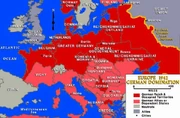
Germany's Possessions, 1942, the Eve of the Race Invasion
Germany was one of Earth's most powerful and most aggressive nations in the 1940s, ruled by Adolf Hitler. It launched World War II by invading a number of neighboring countries and absorbing them into the Greater German Reich. When the Race invaded Earth in 1942, it was engaged in wars with the Soviet Union, which it had invaded, and Britain, which it was fighting in North Africa. It had also declared war against the United States several months earlier, though Americans had not yet deployed against it in force. It was also practicing a genocide against the Jews; in each major city it controlled, Jewish populations were relegated to a ghetto, and mass executions were taking place in concentration camps such as Treblinka. It was a member of the Axis.
The Race recognized Germany as one of the most important Tosevite not-empires and launched simultaneous invasions of it from Poland, Italy and France. German forces initially fared very badly in the field against the superior weapons of the Race, and were driven from most of the extraterritorial gains they had made by launching a series of wars against their neighbors several years earlier. Even then, however, the Germans managed several successes against the Race. They cooperated with the United States, Soviet Union, Britain and Japan in the Big Five.
The most important of these was a raid which Otto Skorzeny commanded and launched in conjunction with the Soviet NKVD in which radioactive plutonium was captured from the site of a destroyed Race starship. Heinrich Jäger was charged with returning the metal to Germany, but was intercepted by Mordechai Anielewicz and stripped of half of it. What remained was not enough to build an atomic bomb, but it was helpful for Germany's atomic researchers, including Werner Heisenberg.
German forces stabilized their various fronts against the Race when the Race entered German territory. They proved quite adept at exploiting the Race's main weakness, its inability to replace expended ammunition and other supplies.
Germany built an atomic bomb in late 1943 and copied the Soviet tactic of burying it underground, withdrawing from a position, and detonating it by radio when the Race took possession of the position in question. Despite retaliation from the Race with its own nuclear weapons, Germany used atomic bombs as an offensive weapon, destroying the Race-controlled cities of Rome and Alexandria using bombs carried on submarines.
Germany's foreign minister, Joachim von Ribbentrop, took part in the negotiations at Cairo which ended the war. Ribbentrop took a very hard line in his demands: for Germany to agree to peace, the Race would need to recognize its borders as encompassing all the territories it had conquered before their arrival (he later abandoned Germany's claim to Poland for fear that it would provoke another war with the Soviet Union). Germany would also be allowed to annex Northern Italy and to protect the sovereignty of Sweden, Finland, Switzerland, Hungary, Slovakia, and Romania.
An uneasy peace prevailed on Earth for the next two decades until the arrival of the Colonization Fleet, by which time Hitler had died and been replaced by Heinrich Himmler. During this period, Germany succeeded in bringing Britain into its political orbit.
When the Colonization Fleet arrived, Germany, which the Race trusted least of all the Tosevite powers, was considered the prime suspect for launching the sneak attack against that fleet with nuclear missiles; in fact, the United States had authorized it.
Like the United States and the Soviet Union, Germany was a spacefaring nation. It maintained a space station in Earth orbit and made regular spaceflights. It was the first nation to land a manned mission on the moon, and also visited Mars. It built the Hermann Göring, an atomic-powered spaceship which travelled to the asteroid belt and, like the American Lewis and Clark, no doubt could have been developed into a starship had it not been destroyed by the Race. The space program, a branch of the military, was commanded by General Walter Dornberger.
When Himmler died in 1965, a period of political wrangling began, during which a Committee of Eight kept a tenuous hold on political authority. This period ended when Dr Ernst Kaltenbrunner was chosen to succeed Himmler as Chancellor.
Kaltenbrunner's short and disastrous chancellorship was marked with an unprovoked and unilateral invasion of Poland which precipitated a second war with the Race, the Race-German War of 1965. Since the Conquest Fleet's arrival in 1942, human powers had generally made an effort to keep a united front in matters relating to the Race; however, only the small nations which relied on Germany completely to preserve their independence allied with it in this war. No other nuclear-capable nation supported Germany despite concerns that allowing the Race to destroy it would weaken the position of remaining human powers in future conflicts with the Race, as their potential alliance would be that much weaker.
The war saw the destruction of Germany's military and infrastructure, though it did manage to do significant damage to the Race, especially in those areas which bordered it such as Poland and Spain. Kaltenbrunner himself was killed, and Chancellorship fell to the Reich Rocket Force commander, General Doctor Walter Dornberger, who immediately requested that Soviet General Secretary Vyacheslav Molotov mediate a peace conference. The terms of this agreement, which the Race imposed almost unilaterally, included the surrendering of all German nuclear and space technologies and the German withdrawal from and reconstitution of France.
Other human powers warned the Race that it was exceedingly difficult to enforce harsh treaties against Germany, remembering the experience of the British and French after World War I. The Race boasted that it had the patience and determination to succeed where the "Big Uglies" had failed. However, Germany began concealing nuclear weapons almost immediately, and had returned to space within a few decades; and while the Race who were supposed to ensure Germany's military in check, and like the Allies of World War I, utterly failed to lived to their so-called devoutness. By 2031 Germany was once again in a position to threaten the Race on Earth--and within a few years it was expected that it would be able to travel between the stars.
Under the ruling Nazi Party, Germany was a volatile and dangerous power which disrupted international relations across the Earth.
Countries Absorbed by the Reich (Prior to Race-German War of 1965)
 Albania
Albania Austria
Austria Belgium
Belgium Czechoslovakia
Czechoslovakia Denmark
Denmark France
France Greece
Greece Italy
Italy Luxembourg
Luxembourg Netherlands
Netherlands Norway
Norway Yugoslavia
Yugoslavia
Countries Dependent on the Reich's Protection (Prior to the Race-German War of 1965)
References
- ↑ The Gladiator, pg. 262.
| ||||||||||||||||||||||||||||||||||||||||||||||||||||||||||||||||||||||||||||||||||||||||||||||||||||||||||||||||||||||||||||||||||||||||||||||||||||||||||||||||||||||||||||||||||||||||||||||||||||||||||||||||||||||||||||||||||||||||||||||||||||||||||||||||||||||||||||||||||||||||||||||||||||||||||||||||||||||||||||

